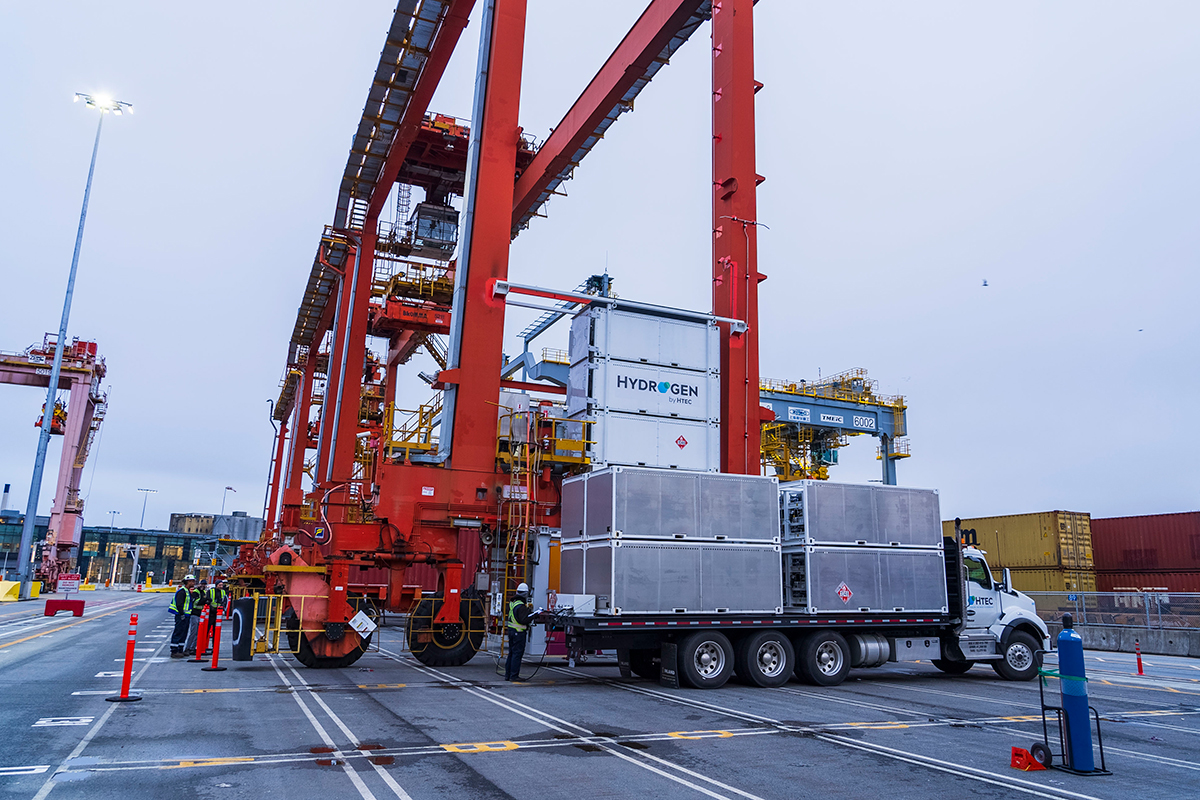DP World's Hydrogen-Powered Crane Advancement in Vancouver
Key Ideas
- DP World moves to the second stage of testing its hydrogen-powered RTG crane at the Port of Vancouver after a successful initial phase, aiming to decarbonize its global port operations.
- The hydrogen technology promises to significantly reduce greenhouse gas emissions, with the RTG emitting only steam during testing instead of the 400 kilograms of CO₂ produced by a diesel unit.
- The project involves the integration of a Hydrogen-Electric Generator, battery storage, hydrogen module, regenerative energy capture, and advanced control systems for efficient and reliable operations.
- Partnerships with companies like TYCROP, H2 Portable, and HTEC highlight the collaborative effort to achieve zero-emission power and drive innovation in sustainable logistics.
Dubai-based DP World has advanced to the second stage, involving a one-year field test, in the development of a hydrogen-powered rubber-tired gantry (RTG) crane. The successful completion of the initial testing phase at the Port of Vancouver, Canada, has paved the way for DP World to assess the feasibility of electrifying its global fleet of 1,500 RTG cranes traditionally powered by diesel. The RTG crane, essential for cargo handling, has been a significant contributor to greenhouse gas emissions, with the Vancouver terminal's 19 RTG cranes alone responsible for 50% of diesel consumption and over 4,200 tonnes of CO2 annually. The adoption of hydrogen technology is expected to drastically reduce or eliminate this environmental impact.
The pilot project, initiated in October 2023, involved retrofitting a diesel RTG crane with an integrated solution comprising a Hydrogen-Electric Generator (HEG), battery energy storage system, hydrogen storage module, regenerative energy capture, and advanced control and safety systems. During testing, the system operated for 16 hours continuously, showcasing its efficiency by emitting only steam and lifting a 40-ton load 105 times, in contrast to a comparable diesel unit emitting 400 kilograms of CO2. As the RTG enters the field trial phase, performance parameters such as hydrogen consumption, energy generation, and regenerative energy capture rates will be monitored to evaluate its productivity, reliability, maintainability, costs, and environmental benefits compared to traditional diesel-powered models.
Scott Mason, President and CEO of TYCROP, emphasized the achievement of zero-emission power through the collaborative efforts with DP World, H2 Portable, and HTEC. The partnership between these companies showcased the potential of hydrogen-based technology in delivering significant performance benefits. DP World's CEO in Canada, Doug Smith, highlighted the company's commitment to sustainable practices and decarbonizing operations, aiming to set a new standard in sustainable logistics. Depending on the results from the field tests, DP World plans to convert its diesel-powered RTG cranes in Vancouver and Prince Rupert to meet its zero-emission objectives. The choice of the Port of Vancouver for the pilot project was influenced by its supportive hydrogen and fuel cell ecosystem, underlining the importance of collaboration between industry and government in driving innovation.
Topics
Middle East
Technology
Innovation
Sustainability
Energy Efficiency
Carbon Reduction
Port Operations
Collaboration
Logistics
Latest News
